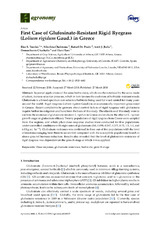First Case of Glufosinate-Resistant Rigid Ryegrass (Lolium rigidum Gaud.) in Greece
Autor
Travlos, Ilias S.
Cheimona, Nikolina
Prado Amián, Rafael de
Jhala, Amit J.
Chachalis, Demosthenis
Tani, Eleni
Editor
MDPIFecha
2018Materia
Dose responseGlufosinate resistance
Herbicide
Growth stage
METS:
Mostrar el registro METSPREMIS:
Mostrar el registro PREMISMetadatos
Mostrar el registro completo del ítemResumen
Repeated applications of the same herbicide(s), which are characterized by the same mode
of action, increase selection pressure, which in turn favours the evolution of herbicide-resistant weeds.
Glufosinate is a broad-spectrum non-selective herbicide being used for weed control for many years
around the world. Rigid ryegrass (Lolium rigidum Gaud.) is an economically important grass weed
in Greece. Recent complaints by growers about control failure of rigid ryegrass with glufosinate
require further investigation and have been the basis of this study. The objectives of this study were to
confirm the existence of glufosinate-resistant L. rigidum in Greece and evaluate the effect of L. rigidum
growth stage on glufosinate efficacy. Twenty populations of rigid ryegrass from Greece were sampled
from five regions, and whole plant dose–response studies were conducted for five populations
under controlled conditions with eight rates of glufosinate (0.0, 0.098, 0.187, 0.375, 0.75, 1.5, 3.0, and
6.0 kg a.i. ha�����1). Glufosinate resistance was confirmed in three out of five populations with the level
of resistance ranging from three-to seven-fold compared with the susceptible populations based on
above-ground biomass reduction. Results also revealed that the level of glufosinate-resistance of
rigid ryegrass was dependent on the growth stage at which it was applied

